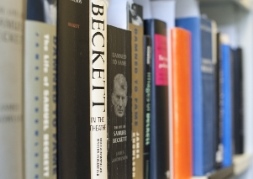We will be holding an exhibition and series of public events to celebrate the University’s internationally renowned collection of manuscripts from the Nobel Prize-winning writer Samuel Beckett (1906-1989).
-
Wednesday 1 – Saturday 4 October
Public Exhibition: Samuel Beckett in London – the Murphy Notebooks
Museum of English Rural Life
FREEAt this exhibition, which will focus on Beckett’s time in London between 1934 and 1935, Special Collection’s recently acquired notebooks for Beckett’s novel Murphy will be on display alongside a wide range of other material.
-
Thursday 2 October
Beckett Archive workshop
2-4pm, Museum of English Rural Life
FREE. Please book in advance.Open to all, this free two-hour workshop will introduce the University’s Beckett archive to participants. It is open to any interested members of the public, but places must be booked in advance.
-
Friday 3 October
Public lecture and drinks reception:
Professor Dan Gunn – ‘Samuel Beckett through his letters’
5.30pm, Minghella Building, Whiteknights Campus
FREE. Please book in advance.Dan Gunn is Professor of Comparative Literature and English at the American University of Paris, and editor of the Letters of Samuel Beckett.
-
Saturday 4 October
The Beckett International Foundation Annual Research Seminar 2014.
10am, Museum of English Rural Life
£20 waged, £15 unwaged. Includes lunch and refreshments. Please book in advance.This day-long advanced seminar will explore some of the latest research in Beckett Studies.
For further details and booking please contact:
Workshop and/or Lecture: Conor Carville – c.carville@reading.ac.uk
BIF Seminar: Mark Nixon – m.nixon@reading.ac.uk



